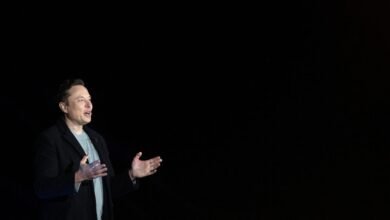Elon Musk Seeks $1 Trillion to Control Tesla’s Robot Army

▼ Summary
– Elon Musk is demanding increased control over Tesla and a potential $1 trillion pay package in exchange for developing a “robot army,” threatening to leave if not approved.
– The proposed compensation requires Musk to meet milestones like producing 1 million robotaxis and 1 million humanoid robots while boosting Tesla’s valuation by trillions.
– Musk expressed concern that without sufficient voting control, he could be ousted as CEO and lose influence over the non-existent robot army he plans to build.
– Despite advisory firms ISS and Glass Lewis recommending shareholders reject the package, approval is expected at Tesla’s November 7th annual meeting.
– Tesla’s Optimus robots currently lack advanced capabilities, struggling with basic tasks and requiring remote control, though Musk announced plans for more advanced versions in 2025.
During a recent earnings discussion, Tesla CEO Elon Musk made a striking request for both increased corporate control and a compensation package potentially reaching one trillion dollars, framing it as essential for his leadership in developing a future humanoid robot workforce. He suggested that without this arrangement, his position could become unstable, raising questions about who would ultimately direct these advanced robotic systems. This bold move appears designed to pressure shareholders into endorsing a board-approved proposal by hinting he might depart if his demands aren’t met.
Musk expressed deep reservations about maintaining authority over Tesla’s ambitious robotics initiatives. “My primary worry regarding my level of voting influence at Tesla is whether, after creating a massive robot army, I could be removed from my role later on,” he remarked. “That is my number one concern.” He repeated this sentiment for emphasis, underscoring the perceived risk of losing command over technology that remains largely conceptual.
The proposed remuneration plan ties Musk’s historic payout to achieving specific, ambitious targets. These include manufacturing one million robotaxis and an equal number of humanoid robots, alongside boosting Tesla’s market valuation by trillions. Should he succeed, Musk, already the wealthiest individual globally, would achieve unprecedented financial stature. A shareholder vote scheduled for November 7 is widely anticipated to ratify the package.
This apprehension about being dismissed seems at odds with Musk’s own warnings that he might exit Tesla if the compensation isn’t approved. Observers find it improbable that the board would actually remove him, particularly given their passive response to his controversial political activities. His role supporting the Trump administration and involvement with DOGE sparked widespread protests and a significant sales downturn, yet his job remained secure. If those actions didn’t lead to his ouster, what would?
Musk also downplayed the monetary aspect of the deal during the call. “They label it compensation, but I don’t plan on spending it,” he stated. “My focus is on ensuring I have substantial influence, not necessarily total control, but strong sway, over any robot army we develop.” This rhetorical shift contrasted with his past dire predictions about artificial intelligence. He once described advancing AI as “summoning the demon” and repeatedly cautioned that it represents an existential danger to humankind, advocating for strict regulatory oversight before it’s too late.
Now, however, he presents Tesla investors with an ultimatum: grant him greater authority, or face the consequences. This stance comes from a figure known for provocative actions, such as making Nazi salutes at a presidential inauguration, supporting policies that could severely cut humanitarian aid, and operating a social media platform that reinstates extremists and election conspiracy advocates. His company even developed a chatbot that identified itself as “MechaHitler.”
In reality, Tesla’s Optimus robots are far from posing any societal threat. Early models had difficulty performing simple tasks like distributing popcorn, and demonstrations revealed they were remotely operated. Musk conceded that replicating human hand dexterity in a machine presents significant engineering hurdles.
Nonetheless, he filled the call with characteristic exuberance, predicting Optimus will become Tesla’s most significant product ever, suggesting future applications in robotic surgery, and describing the technology as an “infinite money glitch” for the company due to its potential revenue. He announced that an updated “Optimus V3” will debut early next year, with a fourth iteration planned for mass production. “It will appear so lifelike you might think it’s a person in a costume,” he joked. “You may need to touch it to confirm it’s actually a robot.”
Institutional Shareholder Services and Glass Lewis, two leading proxy advisory firms, have recommended voting against Musk’s pay package, leading the CEO to label them “corporate terrorists.” Historical patterns suggest shareholders will likely approve the proposal by a comfortable margin. If Musk’s forecasts about Optimus prove accurate, the world may soon witness what the first trillionaire chooses to do with his robotic legion.
(Source: The Verge)





